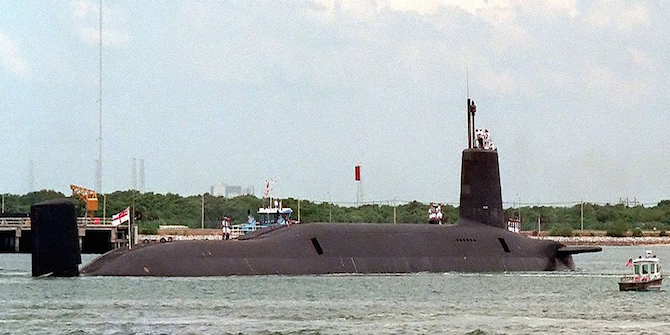In modern international law, it is a near consensus that no state can use force against another – the main exceptions being self-defence and actions mandated by a UN Security Council resolution. However, one more potential exception exists: forcible intervention undertaken upon the invitation or consent of a government, seeking assistance in confronting armed opposition groups within its territory. This volume seeks to analyse the consent-exception in a variety of contexts,including recent cases such those of the Democratic Republic of the Congo, Somalia, Libya, and Syria. Hamish Clift finds International Law and Civil Wars to be exceptionally thorough and useful.
 International Law and Civil Wars. Eliav Lieblich. Routledge. February 2013.
International Law and Civil Wars. Eliav Lieblich. Routledge. February 2013.
President Obama has stated that the use of chemical weapons in Syria is a game changer – a catalyst to United States intervention. But on what grounds may the international community legally intervene in civil war? Eliav Lieblich deals with this vexed question in International Law and Civil Wars, within the paradigm of consent and responsibility. Since the end of the Cold War, internal conflict has become the predominant form of war and the most deadly (see Christine Gray’s International Law and the Use of Force). The role of the international community in intervening in civil war is evolving, driven by the emergent importance of the doctrines of the Responsibility to Protect and the protection of civilians. These norms provided the mode of action through which intervention proceeded in Libya in 2011. In spite of this, international intervention has not been compelled in Syria.
The impotence of international law in dealing with civil war flows from the UN Charter, which creates the fundamental governing principles of state relations. Article 2(4) of the charter regulates the use (and threat) of force and operates to explicitly prohibit the use of force in international dealings. This has been irrefutably reinforced by the International Court of Justice in, among other cases, Nicaragua v USA, where the court said that “what is unlawful… is recourse to either the threat or the use of force against the territorial integrity or political independence of any State.” There are exceptions. In cases of self defence or where force is authorised by a Security Council resolution, the use of force is legal. This means intervention by states which is not sanctioned by the UNSC will be considered a violation of territorial integrity and political independence.
Consent plays a vital role in how the international community may respond. But as Lieblich points out, consent is a problematic term to use to describe the process. If one of the parties to a conflict invites foreign assistance, what results is intervention by invitation. Consent to intervention is ipso facto not given by all parties, there must be at least one party who opposes it and against whom the intervention will proceed. The question of which party has the right to request or consent to intervention forms the basis of International Law and Civil Wars.
The book is organised into ten chapters. The first three are dedicated to exploring some of the substantive issues which arise from the discussion, including the dynamics of consent, concepts of intervention and civil war, and the modalities of forcible intervention. The middle chapters follow a roughly historical narrative, beginning with the period around the American Civil War and ending in the present day, and observe the evolution of conflict. The final three chapters consider the role and the power of consent and the interplay of citizens, governments, governance and the law. Lieblich emphasises issues of sovereignty and effective control and how this influences the legality of a party’s consent to intervention.
Chapter two frames Lieblich’s ideas by defining the concepts of civil war and intervention he relies upon and provides some clarity in refining those definitions by way of substantive analyses. It acknowledges the difficulty in defining these terms due to their complexity and dynamism, especially in modern thought. It also considers the legal definition of internal armed conflict, which is important within an international law context because the rules of jus in bello and international human rights law operate to determine the legality of any state action and therefore intervention by the international community.
The role of governance in assessing the power of consent is considered in chapter nine. Lieblich asserts that democracy and self determination, which are key elements to determining the autonomy and sovereignty of a nation, tend to collapse in situations of civil war. In light of this collapse the principles of protection of civilians and the Responsibility to Protect (an excellent pandect of which occurs in chapter eight) become relevant. Where a government actively disregards its obligation to protect civilians, any power to consent to international intervention will be lost in the face of a secessionist movement.
The possibility of remedial secession and whether it could amount to a right to request or consent to remedial forcible intervention for opposition groups is the crux of the book. Chapter ten, which is easily the most interesting, considers this question within the framework of recognition, humanitarian intervention and self defence. The issue of sovereignty and the evolution of effective control to effective protection, which is discussed in chapter eight, plays a vital role in Lieblich’s reasoning. The theory turns on the respective sovereignty of each internal actor, as informed by these issues. Lieblich acknowledges the controversial nature of this question and is careful not to conclude that opposition consent will legitimise intervention, but that it plays a part in the ethics of intervention and can influence just war considerations.
International Law and Civil Wars is exceptionally thorough and useful. It is easy to recommend to scholars from social science and legal disciplines interested in the nexus of international law and civil war. It is difficult to recommend the book to people who fall outside this realm of readers because the material is technical and at times esoteric. Lieblich’s style, which relies heavily on the use of inverted commas and italics for emphasis, obfuscates the content and could be alienating for some readers. This is a minor gripe and more of a comment on the pervasive style of the genre, but does undermine accessibility and the experience.
Civil wars are complex, dynamic events and the legality of international intervention is problematic. It seems clear from Lieblich’s thesis that where a government ignores human rights obligations and fails to protect its civilians, the ethical, if not legal, responsibility shifts to permit international intervention to which an opposition party consents. It remains to be seen how any so-called game changer in Syria will inform or undermine these ideas in practice.
———————————————————————-
Hamish Clift is a student of Law at QUT in Australia. He holds a BA in literature and philosophy and a Master of Development Economics from the UQ. His research interests include law, economics, governance, development and ethics. He tweets, largely mundanely, at @perishablexcess. Read more reviews by Hamish.







2 Comments